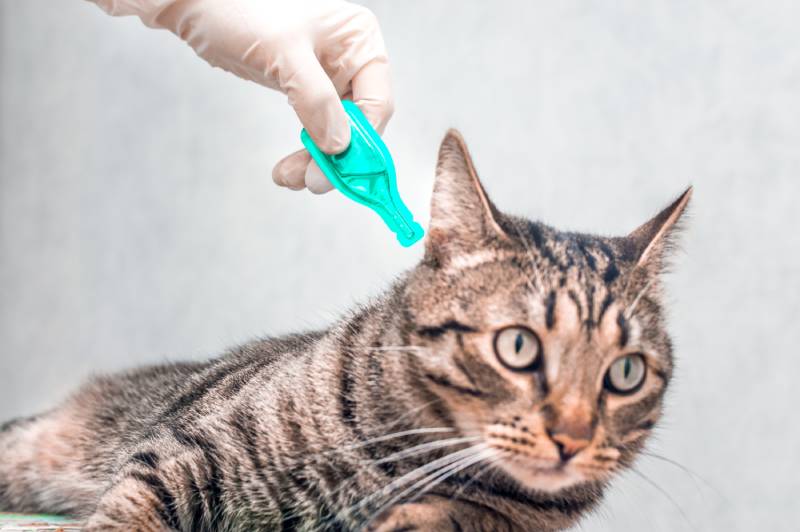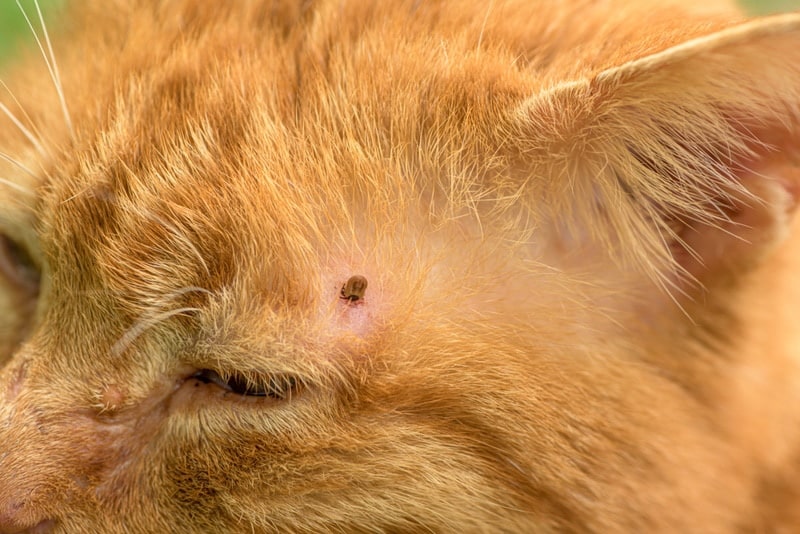If the idea of finding a tick makes you shudder, you are certainly not alone! Hopefully, if you live in an area where ticks are commonly found, you thoroughly check yourself after spending time outdoors.
You have probably heard that dogs should be checked regularly for ticks, too, but have you ever thought about your cat? Our feline friends are known for being meticulous groomers, but it is a common misconception that this is enough to protect them from tick bites.
Here are some facts you might not have known about ticks and cats:

The 8 Facts About Ticks and Cats
1. Any Cat (Even Indoor Kitties!) Can Be Bitten by a Tick
Cats do not have to spend much time outside to pick up ticks, as evidenced by a study published in 20181 that looked at ticks removed from 332 cats in the United States. Approximately 20% of the cats in the study spent less than a third of their time outdoors, and 10 cats were reported to live exclusively indoors!
So, how did the indoor cats get ticks? Some ticks are incredibly small (especially in their larval and nymph stages), so it is possible for people to bring ticks home on their clothing unknowingly. If you live with a dog, they can also carry unwelcome pests inside.
Ask your veterinarian if they recommend a tick prevention program for your kitty, even if they spend most of their time napping on your bed.
If you need to speak with a vet but can't get to one, head over to PangoVet. It's an online service where you can talk to a vet online and get the advice you need for your pet — all at an affordable price!

2. Cats Are at Risk of Picking Up Ticks When the Outside Temperature Is Above 39oF (4oC)
Ticks start questing (looking for a host) when the outside temperature is above 39oF (4oC). Therefore, in many parts of North America, “tick season” can be most of the year.
- Ticks are commonly encountered in wooded areas and tall grass
- They cannot jump or fly; they hang out on grass and other plants and climb onto animals as they brush past
- They do not generally survive well in dry conditions
Weather can vary from year to year, but this interactive map from the American Kennel Club2 can help give you an idea of when you should be on the lookout for ticks in your area.

3. Cats Can Be Bitten by More Than One Tick at a Time
In the previously mentioned study, a total of 796 ticks were removed from 332 cats. This means an average of 2.4 ticks were found on each cat. Some kitties only had one tick, but the highest number was a shocking 46 ticks on a single cat!
Some of the cats with large infestations only had adult ticks, while others were carrying more than one life stage. Interestingly, different types of ticks seemed to prefer certain body parts. Overall, the most common sites of attachment were the head and neck.
4. It Is Important to Check Your Cat Regularly Ticks and, if You Find One, Remove It Right Away
- After climbing onto a host, most ticks crawl around for a while before finding an ideal place to attach. This gives you a chance to remove them before they bite!
- In some cases, disease transmission does not occur until 36–48 hours after a tick attaches. Therefore, removing the tick promptly can significantly reduce the likelihood of your cat contracting a tick-borne disease.
- Prescription tick medications provide excellent protection when used properly, but no product is 100% effective
If your cat goes outside, be sure to check them for ticks when they come back in. Brush them thoroughly and run your hands over their entire body, paying particular attention to areas where ticks commonly attach.

5. There are SAFE and UNSAFE Ways to Remove Ticks From Cats
If you find a tick on your cat, it is important to remove it quickly and safely. If you do not feel comfortable attempting this at home, your veterinary team will be happy to help you!
- Using fine-tipped tweezers, grasp the tick as close to your cat’s skin as possible
- Slowly and firmly pull the tick straight up and away from your cat’s body
- Maintain steady pressure until the tick releases (this may take a few minutes)
- Confirm that you removed the entire tick, including the head, then place it in a sealed container filled with rubbing alcohol
- Wash your hands thoroughly with soap and water
After removing the tick, monitor the area for signs of infection such as redness, swelling, tenderness, and discharge. Ask your vet if they want to submit the tick to a laboratory for identification, disease testing, or inclusion in a research study.
- Touch the tick with your bare hands
- Attempt to remove the tick by covering it in petroleum jelly, nail polish, or by burning it with a match
- Twist the tick (the head may break off and remain embedded in your cat’s skin)
- Squeeze or crush the tick (this is likely to cause it to regurgitate and release any disease-causing agents it may be carrying)
After removing the tick, do not apply anything to your cat’s skin without consulting your veterinarian. This is especially true for products containing neomycin, which can cause severe allergic reactions in cats.
6. It Is Possible for Cats to Contract Certain Diseases After Being Bitten by an Infected Tick
Not all ticks transmit disease, but here are two examples of tick-borne diseases:
Lyme Disease (Borreliosis)
Lyme disease is probably the most well-known tick-borne disease in North America, but we do not currently have a clear understanding of how it affects our feline friends.
- Experimentally infected cats have not shown signs of clinical disease
- Multiple studies have identified seropositive cats (indicating previous exposure to the bacteria), but according to the most recent consensus statement published by the American College of Veterinary Internal Medicine (ACVIM) in 2016, there have not been any reported cases of naturally occurring Lyme disease in cats.
- Caused by Borrelia burgdorferi bacteria
- Transmitted by Blacklegged Ticks
- Most commonly identified in the Northeastern United States

Cytauxzoonosis
Cytauxzoonosis is a severe, rapidly progressing, and often fatal disease of domestic cats. Kitties living near wooded areas, particularly those populated by Bobcats (the wild reservoir species), are considered at risk.
- Caused by a protozoal organism called Cytauxzoon felis
- Transmitted by American Dog Ticks and Lonestar Ticks
- Identified in the Central, South Central, and South Eastern United States
Other tick-borne diseases identified in cats in the United States include Tularemia, Anaplasmosis, and Ehrlichiosis. Check out the Annual Pet Parasite Forecasts from the Companion Animal Parasite Council (CAPC) to learn which tick-borne diseases are most common in your area.
7. We Do Not Currently Have Any Vaccines to Help Protect Cats From Tick-Borne Diseases
A vaccine is available to protect dogs from Lyme disease, but a similar vaccine does not exist for cats. Fortunately, based on our current knowledge, cats seem to be at a much lower risk of developing clinical Lyme disease than dogs.
Research is ongoing to develop a Cytauxzoonosis vaccine, with promising results so far. Hopefully, in the future, this will be an option to protect cats living in high-risk areas.
8. You Should Only Use Tick Prevention Products for Your Cat That Your Veterinarian has Approved
Cats are extremely sensitive to many insecticides used in flea and tick preventives. This is especially true for products available over the counter and particularly if they are labeled for use on dogs.
Never use a dog flea and tick product on your cat!
The safest way to protect your cat from ticks is to use a veterinary product prescribed for your cat based on their age, weight, and overall health.
If ever you apply a flea and tick product to your cat, and they show signs of an adverse reaction (e.g., vomiting, difficulty breathing, tremors, seizures, etc.), contact a veterinarian immediately.

Conclusion
It is crucial to inspect your cat regularly for ticks and talk to your veterinarian about tick prevention, even if your kitty spends most of their time indoors. Remember to check yourself too! Ticks might be small, but the diseases they transmit can have significant health consequences.
Featured Image Credit: Lubo Ivanko, Shutterstock



















